Richibi’s Weblog
Just another WordPress.com weblog
Category: dramatic monologues
March 13, 2020
on love – “Nature Boy”

unidentified
_______
for Danielle and Joe
a few nights ago, friends came over, a
young couple, in the bloom of youth,
relatively speaking, half, approximately,
my age, I’m seventy, for a glass of wine
during a conversation about the many
knickknacks scattered about my
apartment, pictures, paintings,
assorted paraphernalia, memorabilia,
they asked, was there one piece of
information I could give them,
something not just physical, but
metaphysical, that could lead to a
good and meaningful life
after cautioning that any answer would
be way too complex, the question way
too broad, I nevertheless trotted out,
convivially, a few words of ready
wisdom, a couple of trusted and true
maxims I hold in store for such
occasions, personal precepts,
however seemingly flippant, I
faithfully and diligently live by
pray for grace, for instance, make sure
your tie’s on right, the only two
practicable positions in any
predicament, I’ve found
later, after privately thinking more
about it, I realized there is indeed a
specific answer, I’d been singing it
already for a while, to help me deal
with recent, and even accumulated,
loss, it is the punchline to this
wonderfully enchanted
composition, called Nature Boy
the greatest thing you’ll ever learn,
it knowingly advises
January 1, 2020
“The Boulevard of Broken Dreams”

“Lipstick“ (1908)
Frantisek Kupka
__________
whenever my heart is broken, I’ve recently
noted, I’ve learned to sing a corresponding
song, it didn’t happen by design, but
organically, it seems, as a response to my
periods of anguish, a song would come up,
each time, to contain the dimensions of my
rue
I need to learn the notes, which are usually
tonal and melodic, with the characteristic
that they pretty consistently span a vocal
range that requires some intimate attention,
work that tears me away, studiously and
diligently, from my own private concerns,
in order to consider, through his, her, very
articulated lyrics, those of another, not to
mention the response of my proposed
audience
I have developed quite a repertoire
recently, this has been my aria
I was especially impressed by the
irony in the composition, the
songsmith laughing at himself,
melodramatizing his sentiments,
taking the sting out of his despair,
if you’ll pardon the allusion,
with over-the-top, it must be
admitted, metaphors, allegories
I mean, I walk along a street of
sorrows, a boulevard of broken
dreams, you need a big floppy
hat, and very red lipstick to pull
that one off
you ought to see me
enjoy
R ! chard
November 9, 2019
“Death is nothing at all…” – Henry Scott Holland

“St Paul’s Cathedral“
Thomas Hosmer Shepherd
_____________
upon learning of the recent demise
of my younger sister, my only sibling,
a friend sent me the following passage
“Death is nothing at all. It does not count. I have only slipped away
into the next room. Nothing has happened. Everything remains
exactly as it was. I am I, and you are you, and the old life that we
lived so fondly together is untouched, unchanged. Whatever we
were to each other, that we are still. Call me by the old familiar
name. Speak of me in the easy way which you always used. Put
no difference into your tone. Wear no forced air of solemnity or
sorrow. Laugh as we always laughed at the little jokes that we
enjoyed together. Play, smile, think of me, pray for me. Let my
name be ever the household word that it always was. Let it be
spoken without an effort, without the ghost of a shadow upon it.
Life means all that it ever meant. It is the same as it ever was.
There is absolute and unbroken continuity. What is this death
but a negligible accident? Why should I be out of mind because
I am out of sight? I am but waiting for you, for an interval,
somewhere very near, just round the corner. All is well. Nothing
is hurt; nothing is lost. One brief moment and all will be as it was
before. How we shall laugh at the trouble of parting when we
meet again!”
it is usually presented as a poem, but
was part of a sermon, rather, given by
Henry Scott Holland, the very pastor
who composed it, at St Paul’s
Cathedral, in London, after the death
of Edward Vll
listen
it expresses well the experience I’ve
had with others of my beloved
departed
intimations of my sister are already
popping up in my reality, soon, I told
another friend, I’ll be talking to her
more often than when she was not
gone
much as is the case with my father,
for instance, away some 30 years
now, but an abiding presence,
however mystical, still, and,
it appears, forever
I consider myself profoundly
blessed
R ! chard
September 23, 2019
Piano Concerto no 2, opus 19 – Beethoven






